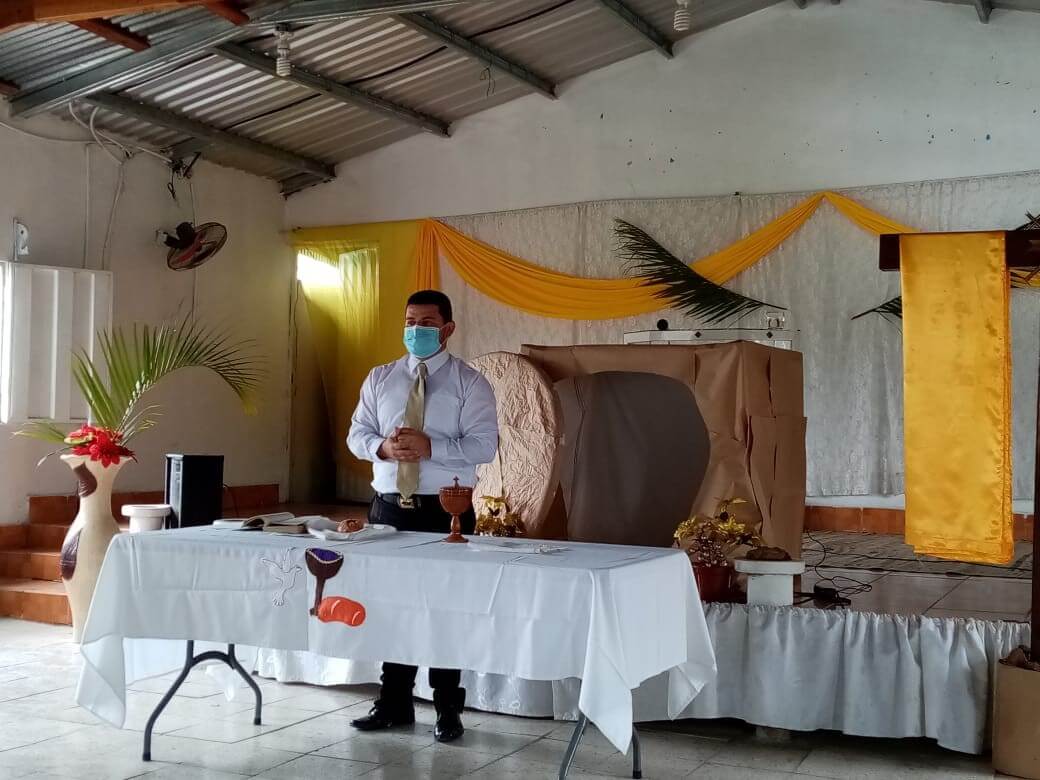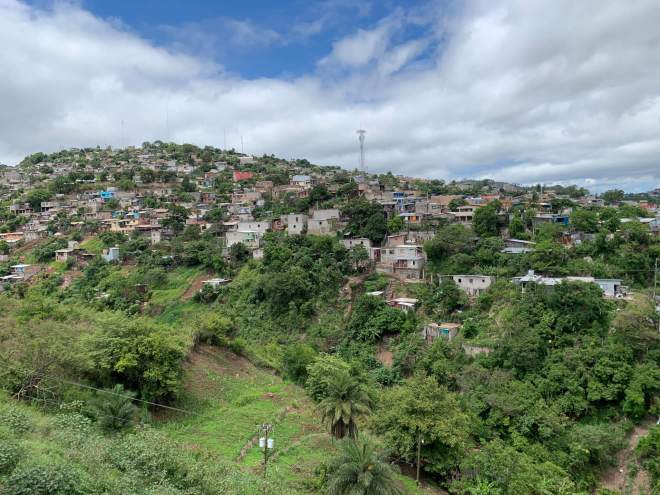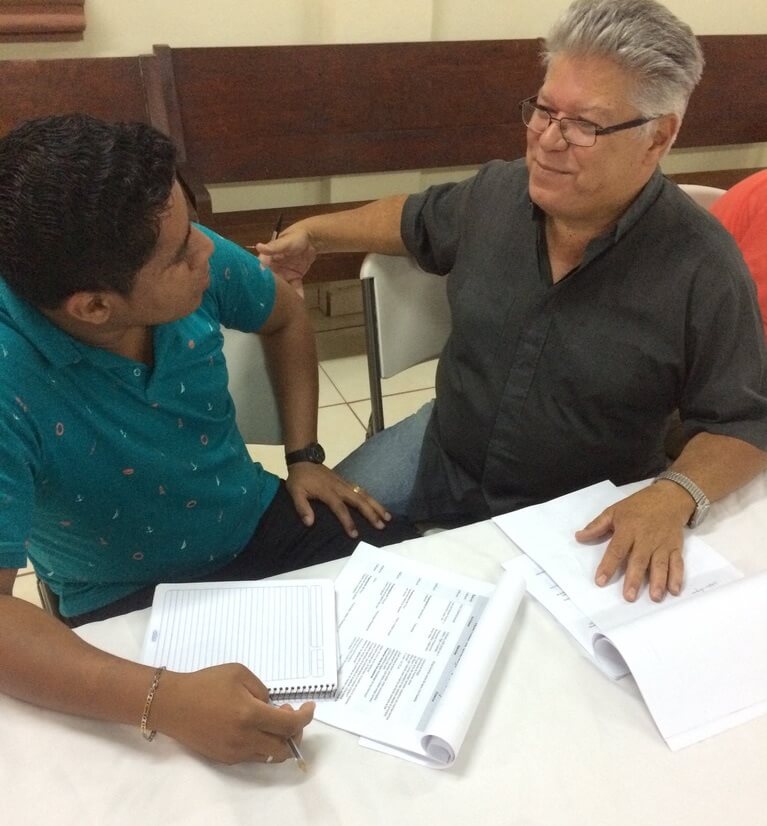Opening doors to education for Honduran pastors

A United Methodist pastor in Honduras delivers a sermon and presides over communion for his congregation. PHOTO: COURTESY OF OSÍAS SEGURA-GUZMÁN
UMC congregations and ministries in Honduras strengthen as leaders are given the opportunity to increase their reading comprehension levels.
By Osías Segura-Guzmán
July 22, 2021 | HONDURAS
Latin America and the Caribbean is a region impacted by systemic inequality.
The rich get richer, while poverty impacts the majority of the population. The unfair distribution of wealth linked to weak public policies fuels this inequality.
As a missionary and a foreigner, it is amazing to observe how the poor and the wealthy live as two segregated, parallel universes that only sometimes intermingle. Meanwhile, the small middle class anxiously lives in its own fragile bubble between those two worlds, fearing them both.

In this context, there is a relationship between education and poverty. Four out of 10 Latin Americans do not finish high school; it is common for students to leave school before they reach the age of 12. For the northern triangle countries of Guatemala, El Salvador and Honduras, the rate of students not completing high school is double that of other countries in Central America. These young people are the first victims to be recruited by gangs in marginal neighborhoods. In Honduras specifically, 30% of children do not go to school and nearly 50% of families are single-parent families who do not receive any government support. The educational system in Honduras is also qualitatively poor and inadequate. All of these factors contribute to a low educational level among much of the population. It is a vicious cycle that continues for generations.
Starting with the basics
This cycle of poverty and inadequate education also affects the growth of The United Methodist Church in Honduras. Most pastors of United Methodist churches grew up with little or limited education. Yet the United Methodist Book of Discipline clearly outlines the necessity for study in order to become a pastor and for continuing education throughout a pastor’s life (¶ 324.4.6.c).
As a part of my responsibilities as a missionary, I am tasked with administrating the theological education of pastors in Honduras. The United Methodist Mission in Honduras started about 25 years ago and is currently in the process of becoming a provisional conference. Since it is a mission, pastors have been appointed to churches while still in the process of becoming educated, licensed and ordained. Most of the pastors finished their high school education as adults, but often have serious academic deficiencies and struggle with reading comprehension and writing. How can we do theological education in this context? And from their perspective, would you enjoy studying if you had difficulty with reading comprehension and writing?
In the past, we have taught pastors through traditional theological education courses, attempting to work through these challenges. When the first four students finished the program, they were asked to write an adaptation of the theological exam as described in the Discipline (¶ 324.4.9). They felt frustrated and incapable of expressing their learning through writing, even when mentored. So, we began asking ourselves, what else could we do? We have 15 more pastors ready to start their theological education, but they have the same challenges. The students deserve a contextualized program, and they also need good and constructive feedback. What can we do when the students lack the basic skills for learning?
I learned about a reading rehabilitation program called Glifing from a missionary colleague. Through a Global Ministries’ grant, we hired a consultant to provide reading evaluation for nine pastors in November 2020. Each pastor was evaluated for reading speed, comprehension and recall, among other areas. Despite all of our pastors having completed high school, the evaluation showed that most read at the level of a primary student (1st-2nd grade) and at very slow speeds. For instance, a 10th grade student should be able to read 164 words per minute (WPM). We discovered that only two pastors were able to read a simple text at a speed of 141 WPM, and the lowest score was 78 WPM. No wonder the pastors were frustrated trying to do a university or graduate level academic program!
Thanks to the brain’s elasticity, the program facilitates the rehabilitation of reading and reading comprehension for students, allowing them to independently work through online exercises multiple times a week to reach an appropriate reading level. To take our students to at least a middle-school level in reading skills and comprehension, they participated in the training program four days a week, 20 minutes per day, for a period of four to six months. First, the consultant worked as a coach, and then the students began accessing an online platform to do the daily exercises on their own. (Of course, to accomplish this, the pastors have to access an internet connection, which is often a challenge in Honduras.)

PHOTO: OSÍAS SEGURA-GUZMÁN
Stretching to become better pastors
Pastors who achieve a middle-school reading level will certainly be better teachers, preachers and caregivers. These leaders will be capable of recalling information, developing better writing skills, processing information and making timely decisions as pastors.
For Pastor “A”, being a part of the program has helped him grow personally and professionally: “Glifing is a very good tool that helps me to read, to think, and to memorize better. Now I understand the importance of perseverance to develop with discipline the weekly exercises. That helps me, as a pastor, to interpret the Scriptures and better understand the literary figures in the text.”
We are currently starting the third month of rehabilitation. While we continue to face challenges, such as some pastors struggling to follow directions or complete all the assignments and wrestling with feelings of shame in discovering their weaknesses in reading well, we expect that the impact of reading rehabilitation on the pastors will be a blessing for their ministries. Once the rehabilitation is finished, the pastors will take additional theological classes (hopefully by Fall 2021), which will empower them to continue practicing their new reading skills.
We are fighting against one of the effects of systemic poverty with a desire to equip leaders who will lead their congregations with sound doctrine and theological thinking. We hope the pastors will practice daily reading to continue to strengthen their abilities to learn and to teach, thus blessing the Honduran people and church.
The Rev. Dr. Osías Segura-Guzmán is a United Methodist missionary serving as the regional coordinator of Curriculum and Small Group Leadership Development in Latin America and the Caribbean.

